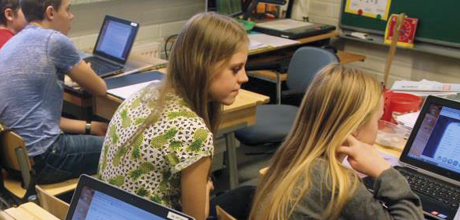The Experiences from Pilot Libraries and Schools

"The class's habit of working in groups was clearly beneficial. Pupils advised each other and solved problems together in a group. Pupils have the right to plan and brainstorm projects for themselves. The project emphasised cooperative learning methods, child orientation and strong inclusiveness."
"Technology has provided us with extra motivation for studies. We utilise it extensively in information retrieval. We approach media education from various perspectives taking into account newspapers, electronic media and literature. We utilise game learning a great deal in all grades."
"The school has just taken new iPads into use and teachers are receiving training. Blogs have been created for classes. Enthusiasm about the utilisation of technology and development of multi-literacy in teaching is great and its significance has been recognised. The learning environment was expanded through the library blog."
"Lukuinto brought special reading nooks in the classrooms, where the children could relax and read books. In addition, book corners/tables were brought into classrooms. We also cooperated in creating snug class libraries decorated with pillows, beanbags, couches and soft toys. There were more books than normal in the classrooms and they were assimilated into the learning environment. Lukuinto was evident also as posters and brochures in the corridors. Lukuinto logo is also displayed on the school, library and municipality websites. A washing line with information pamphlets promoting the joy of reading was attached to the children's department at the library."
"The physical furnishings of the classrooms have been changed both at elementary and secondary schools. For example, desks have been replaced with round tables and groups of tables. Chair types have also been changed to more easily movable ones with wheels."
"The school ceased to be the only environment where information was sought, since various other information sources provided by the town were also utilised."
"The significance of reading has been highlighted during the boys' basketball team's trips to away matches and according to the coach's instructions an hour's reading period in which everyone participated has been kept in the bus. Book recommenders have collected suitable reading materials for the boys. In this way, reading has now been linked to a hobby of a different kind."
"Through games, teachers have the opportunity to acquaint themselves with the interests of the pupils and their way of thinking, while expressing themselves though games feels easy and natural to pupils."
Multi-literacy essentially includes the idea of inclusion. Inclusion requires knowledge, skills, support and practise. One pilot project participant who had experimented with “peer recommendation”, appositely brought out the elements, which have to be taken into account pedagogical practices supporting multi-literacy skills. The project is a good example of how inclusion and eliciting responsibility are performed in a supported way, step by step through practising:
"I told the peer recommender the meaning of the project and, by way of an example, recommended books to them in the same way they would to second grade pupils later. During the second meeting, fifth grade pupils prepared and practised recommending books for their dedicated classes ... Peer recommenders were given tasks, which they should perform at the book recommendation event ... Cooperation was evident in that a recommender group had distinguished itself in each class, each member of which had their own important duty ... Most meetings and planning sessions enabled pupils to be active in their activities ... My own role changed into that of an enabler when the duty of recommending moved to pupils."




